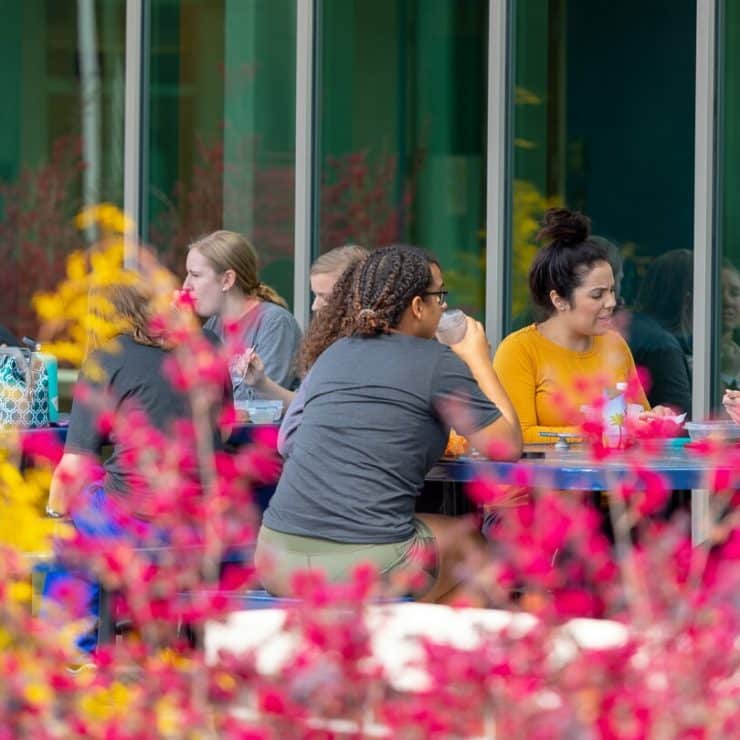
Doctor of Occupational Therapy Program Admissions
Class of 2028 Admissions Cycle
The Class of 2028 Admissions cycle (for a Fall 2025 start) opens Friday, July 19, 2024, on OTCAS.
Admissions Contact
Email: [email protected]
Admissions Pathways
The Department of Occupational Therapy offers three avenues for admission into the entry-level Doctor of Occupational Therapy Degree (OTD) Program.
Prerequisite Courses
In addition to the degree requirements, candidates for admission will also have to satisfy the program prerequisites.
Admissions Procedures
Consistent with the University admission policy, admission to the Methodist University OTD Program is without regard or discrimination on the basis of race, religion, national origin, sex, age, marital status, or status with regard to public assistance or disability. However, becoming an occupational therapist requires the completion of an education program which is intellectually as well as physically challenging, that the candidate should be able to perform in a reasonably independent manner, and reasonable accommodation does not mean that students with disabilities are exempt from certain tasks inherent to the practice of occupational therapy. Methodist University’s Program in Occupational Therapy is committed to recruiting, enrolling and educating a diverse student body.
The MUOTD Program does not require applicants to take the Graduate Record Exam (GRE). If the candidate is a non-native speaker of English, a Test of English as a Foreign Language (TOEFL) may be required.
Observation Hours
Each applicant should complete a minimum of 50 hours of professional exposure activities to include two different settings or populations. Professional exposure can include direct shadowing of an OT practitioner or virtual and remote professional exploration activities. Applicants may gain exposure to populations served by OT through a variety of volunteer and community services opportunities. Serving with an organization can help expand your knowledge of the challenges, strengths, and needs across and within client populations. Examples: Meals on Wheels, summer camps for children with developmental or chronic conditions, long term care facilities (nursing homes), and adaptive sports programs.
Students need to be aware that felony related charges and convictions may prevent participation in fieldwork experiences. In addition, a criminal record may prevent the student from taking the National Board Certification of Occupational Therapists (NBCOT) exam and also from becoming licensed. A student should contact NBCOT if there is a prior criminal record that might interfere with eligibility to sit for the national exam.
Letters of Recommendation
Two letters of recommendation are required from:
- A professor, teacher, or academic advisor who is familiar with the applicant’s scholastic performance.
- A person, other than a relative or friend, who is familiar with the applicant’s professional work capacity, professional behavior, and dependability (a person who supervised observation experiences is encouraged).
Personal Essay
The OTCAS application requires a personal essay submission with no word limit. This is an opportunity for the applicant to demonstrate their writing skills in describing their life experiences, professional goals, and knowledge of the profession.
Application Submission
All applicants to the Methodist University OTD Program must apply through the Centralized Application Service for Occupational Therapy Program (OTCAS). The MU OTD Program does not utilize a supplemental application. The program has one start date each year, which is mid-August.
Application tips
- Review OTCAS Applicant Help Center to familiarize yourself with the application process, terminology, application stages, grade entry, GPA calculations, etc.
- Review Calculating Your OTCAS GPAs for more information about how GPAs are calculated by OTCAS. The MU OTD Program will use OTCAS GPA calculations for all areas (overall, pre-requisites, post-bacc, graduate, subjects, etc.)
- Allow yourself plenty of time to complete the application. The average applicant will spend ten or more hours completing the OTCAS application. The verification process will take up to four weeks. Starting early will allow you to resolve any problems that may arise so that you are not at risk of missing deadlines.
- If applicable and to ensure the program is aware of your plans to complete outstanding prerequisites, be sure to list any planned or in-progress coursework on your application before submitting for verification. Applicants who have outstanding prerequisite coursework at the time of application will still be considered for an interview and acceptance. However, acceptance into the program will be contingent upon successful completion of the coursework by the end of the spring semester. The program does not waive prerequisite coursework requirements.
- The MU OTD does not review an application until it is in a “verified” status. Applicants should log on to OTCAS at least once weekly to reference the application status and to ensure there are no missing items that would hold up the verification process. Letters of recommendation and official transcripts are common items that can hold up the verification process.
Required documents that need to be submitted to OTCAS
- Official transcripts from all colleges attended
- Letters of Recommendation – Two letters of recommendation in two categories: one academic and one professional work (observation hours, employment) related. OTCAS will allow up to five letters.
- Personal Essay
- MU OTD Admission Requirements
Applicant Review Process
Prior to being submitted to the Admissions Committee, all courses and grades entered by the applicant will be verified by the OTD Program Admissions Director. Once the application has been verified, the information will be forwarded to the OTD Program Admissions Committee, who will begin the Applicant Review.